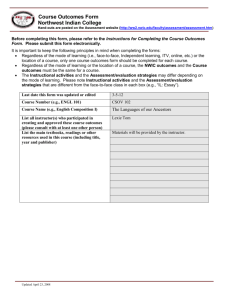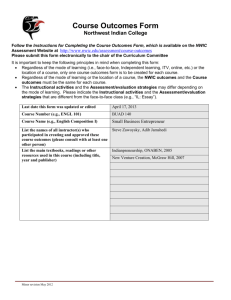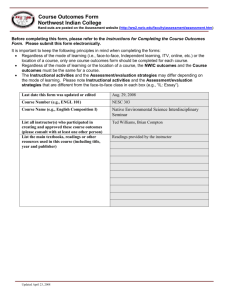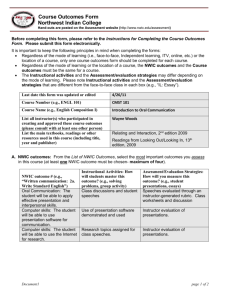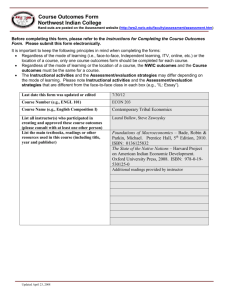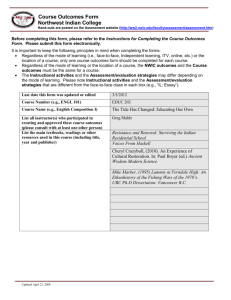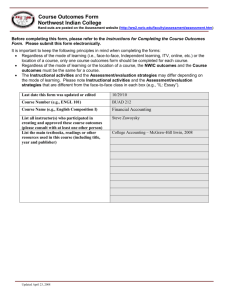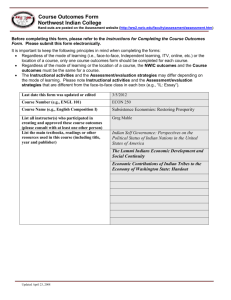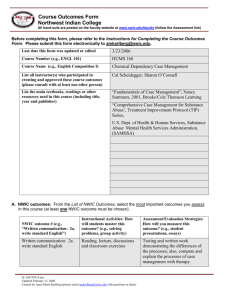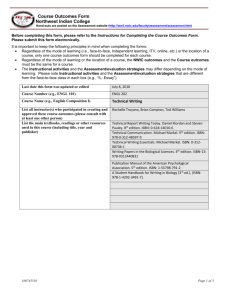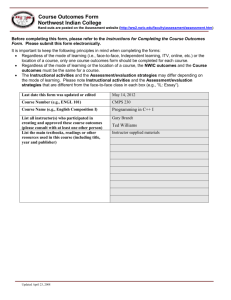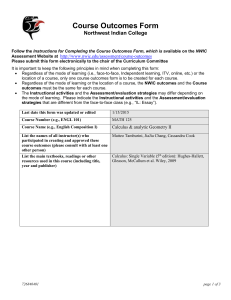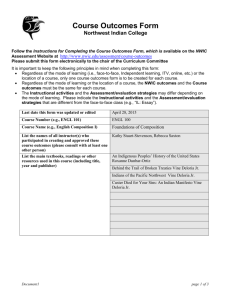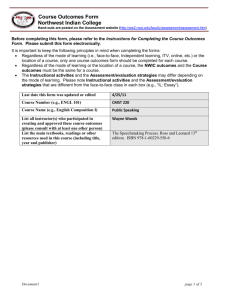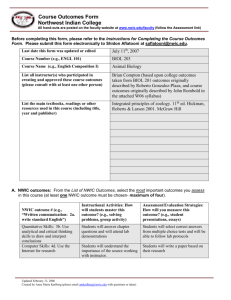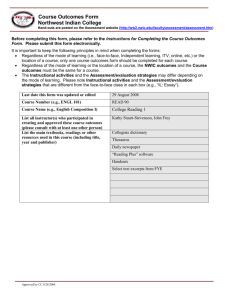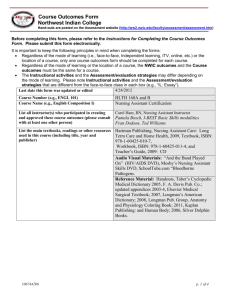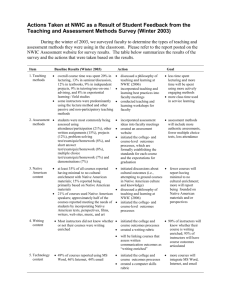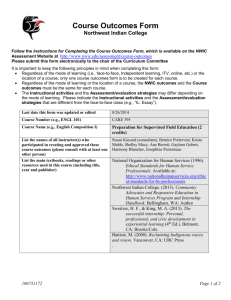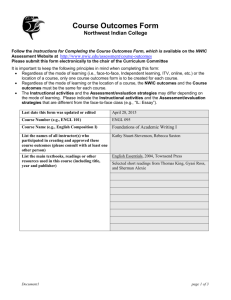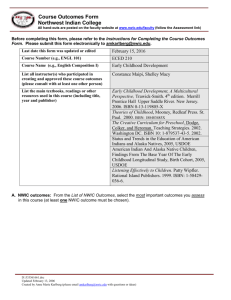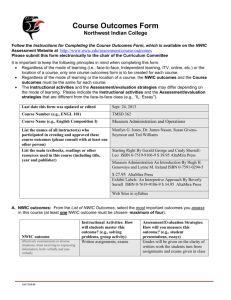CMST 210 - Northwest Indian College
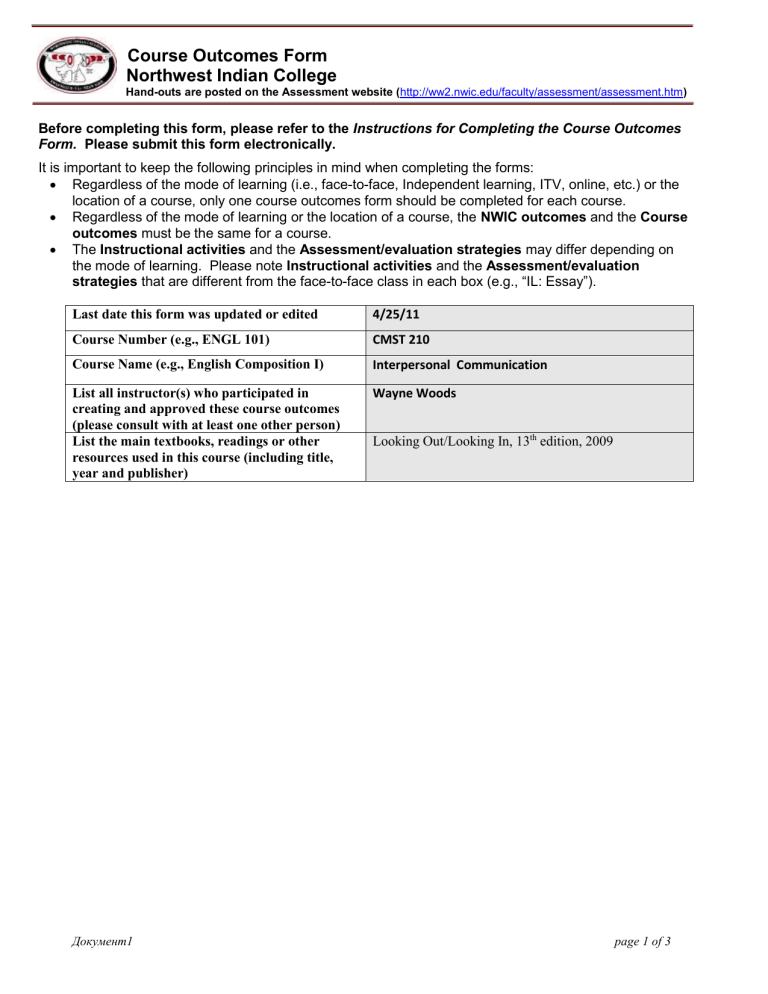
Course Outcomes Form
Northwest Indian College
Hand-outs are posted on the Assessment website ( http://ww2.nwic.edu/faculty/assessment/assessment.htm
)
Before completing this form, please refer to the Instructions for Completing the Course Outcomes
Form. Please submit this form electronically.
It is important to keep the following principles in mind when completing the forms:
Regardless of the mode of learning (i.e., face-to-face, Independent learning, ITV, online, etc.) or the location of a course, only one course outcomes form should be completed for each course.
Regardless of the mode of learning or the location of a course, the NWIC outcomes and the Course outcomes must be the same for a course.
The Instructional activities and the Assessment/evaluation strategies may differ depending on the mode of learning. Please note Instructional activities and the Assessment/evaluation strategies that are different from the face-toface class in each box (e.g., “IL: Essay”).
Last date this form was updated or edited 4/25/11
Course Number (e.g., ENGL 101)
Course Name (e.g., English Composition I)
CMST 210
Interpersonal Communication
Wayne Woods List all instructor(s) who participated in creating and approved these course outcomes
(please consult with at least one other person)
List the main textbooks, readings or other resources used in this course (including title, year and publisher)
Looking Out/Looking In, 13 th edition, 2009
Документ1 page 1 of 3
A. NWIC outcomes: From the List of NWIC Outcomes , select the most important outcomes you assess in this course (at least one NWIC outcome must be chosen- maximum of four ).
NWIC outcome -- Oral
Communication
Oral communication skills:
Students will be able to:apply effective interpersonal communication skills.
Instructional Activities: How will students master this outcome? (e.g., solving problems, group activity)
Class discussions, worksheets and individual class presentations by students.
Assessment/Evaluation Strategies:
How will you measure this outcome? (e.g., student presentations, essays)
Worksheets and Instructor evaluations.
Written communication skills:
Students will be able to write standard English in a variety of text forms using various credible sources.
Worksheets and short writing assignments
Acceptable completion of work
Computer skills: Students will be able to use word processing software for communication and the
Internet for research.
Research on discussion issues Student self evaluation of information as it is presented to the class
B. Course outcomes: In order of priority, list the most important other learning outcomes for this course that you assess ( a maximum of 10 ).
Other course outcomes:
Complete the sentence –
As a result of this course, students will be able to… describe the processes involved in oral communication by defining and characterizing its major models clearly communicate ideas and information orally.
Instructional Activities: How will students master this outcome?
(e.g., solving problems, group activity)
Readings, Class
Discussion, completion of speeches, completion of portfolio
Assessment / Evaluation Strategies:
How will you measure this outcome?
(e.g., student presentations, essays)
Class discussion, portfolio, speeches. explain the relationships between interpersonal communication and selfconcept, perception, and the symbolic nature of language.
Документ1
Daily in-class and homework assignment writing in response to readings or video/lectures and exercises on Standard
English
Evaluation of writing and exercises
Daily in-class and homework assignment writing in response to readings or video/lectures and exercises on Standard
English
Evaluation of writing and exercises page 2 of 3
describe cultural aspects of communication as they relate to personal experiences. utilize oral organizational skills in other situations and classes including using the
Internet, electronic library databases, or other online material for research define nonverbal communication and identify types (ditto) organize an oral argument.
In class discussion, outside speakers.
Class discussion and lectures summarizing changes and evolution of information gathering and reporting
Classroom demonstrations and activities.
Class discussion of issues of cultural and political importance.
Instructor evaluation of discussion, formal evaluation.
Evaluation of class discussion.
Use of critical thinking processes in evaluating data.
Class worksheets and instructor evaluations in class
Instructor observation
Документ1 page 2 of 3
